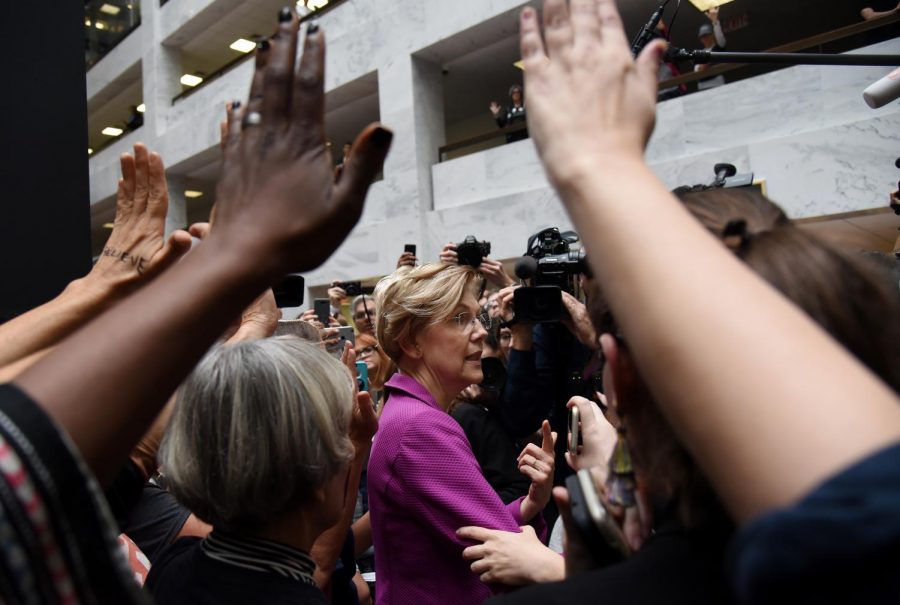What Kavanaugh’s confirmation means
Oct 24, 2018
In wake of the contentious confirmation of District of Columbia Appellate Judge Brett Kavanaugh to the Supreme Court, we should review what has happened and understand what this means going forward.
As the #MeToo movement rose, the phrase “We should always believe accusers” has been thrown around. Well, if belief makes something true, I should’ve never stopped believing in Santa Claus.
I don’t believe women. I don’t believe men. I believe evidence. And we have had to remind ourselves of this during Judge Brett Kavanaugh’s Supreme Court nomination.
Time for a quick refresher of our legal system. We rely upon the presumption of innocence, not the presumption of guilt. In the United Nations’ Universal Declaration of Human Rights Article 11, the defense must present compelling and holistic evidence to a judge or jury before a guilty determination can be made. We should never seek to undermine due process, regardless of political affiliation or gender, so it was especially troubling when many in the media had seemingly already made up their minds about Judge Kavanaugh’s guilt.
In March 2017, the Journal of Forensic Science published a study analyzing 90,000 rape allegations using data provided from the FBI between 2006 and 2010. They found that 5.55 percent of all rape allegations were falsified, a rate more than five times higher than any other violent crime.
Get The Daily Illini in your inbox!
Additionally, when the Innocence Project — a non-profit organization dedicated to overturning wrongful convictions in which the defendant is on death row — analyzed data, they found that of the 239 cases they reviewed, 73 percent were rested based on two or more eyewitnesses. In additional research conducted by the Marshall Project, of the nearly 75,000 annual police lineups conducted annually, between 20 to 25 percent of witnesses picked a “foil,” a volunteer picked by the police to fill out the lineup. The unreliability of eyewitness testimony is well-documented in psychology.
If you take a look at Dr. Christine Blasey Ford’s allegations, based on an event that occurred 35 years ago and relies upon eyewitness accounts, both the data and the basis of our legal system insist we be skeptical.
When we look at Dr. Ford’s testimony, it offered no details tying Judge Kavanaugh to these allegations. Even further, two men have come forward and claimed responsibility for the attack, while Leland Ingham Keyser, Dr. Ford’s friend who she claimed could tie Kavanaugh to the party, is unable to do so.
Since the FBI investigation of these allegations didn’t turn up any evidence, what we should have seen is a unanimous confirmation for Kavanaugh. Instead, we got the closest confirmation vote since Clarence Thomas, and right down party lines — save for West Virginia Senator Joe Manchin (D).
With these 11th hour allegations holding no water, we know these actions are a ploy to publicly slander another Republican-appointed Supreme Court justice nomination. As a past example, we only have to look as far back as to Robert Bork and Clarence Thomas.
Robert Bork was nominated to the Supreme Court in 1987 by President Reagan, where he was met with a less-than-warm welcome by Senator Ted Kennedy. After this diatribe was delivered and Bork’s video rental history was leaked to the press, Senator Joe Biden, the head of the Senate Judicial Committee at the time, was happy to oblige with Senator Kennedy’s motivations. After the failed vote, Bork resigned from his position, never to work again as a federal judge.
Similarly, in July 1991, President George H. W. Bush nominated Clarence Thomas to the Supreme Court. Here Anita Hill, a former colleague of Thomas, accused him of inappropriate advances and harassment. Thomas alleged the hearings related to the allegations were slanderous and inappropriate.
Despite numerous witnesses testifying in favor of Thomas, the vote became, in the words of Senator Biden, a “he-said, she-said” affair, and Thomas was confirmed 52-48.
With an increased lack of respect for civility and empathy in our political interactions, we run the risk of losing what is most important. Our rights to privacy, free speech and fair trial, which are inalienable regardless of political affiliation. While we should take victims and allegations of any criminal activity seriously. We should also not take them to be truth. Wherever there is an accuser, there is also a defendant.
Ajay is a junior in Engineering.






